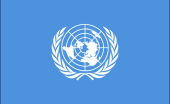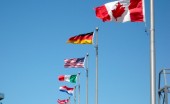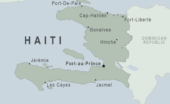Molly Minturn - My family is heartbroken to share that my father died in surgery on Monday, Feb. 10. It…
Haiti April 2024-
Written by Diana Thebaud Nicholson // November 21, 2024 // Americas // Comments Off on Haiti April 2024-
The Caribbean Community (CARICOM)
5 October 2021
‘The Greatest Heist In History’: How Haiti Was Forced To Pay Reparations For Freedom
(NPR) … While the U.S. officially left Haiti in 1934, it continued to control Haiti’s public finances until 1947, siphoning away around 40% of Haiti’s national income to service debt repayments to the U.S. and France.
Much of this debt to France was the legacy of what the University of Virginia scholar Marlene Daut calls “the greatest heist in history”: surrounded by French gunboats, a newly independent Haiti was forced to pay its slaveholders reparations. … Haitians compensated their oppressors and their oppressors’ descendants for the privilege of being free. It took Haiti more than a century to pay the reparation debts off
20 May 2022
The Root of Haiti’s Misery: Reparations to Enslavers
(NYT) … for generations after independence, Haitians were forced to pay the descendants of their former slave masters, including the Empress of Brazil; the son-in-law of the Russian Emperor Nicholas I; Germany’s last imperial chancellor; and Gaston de Galliffet, the French general known as the “butcher of the Commune” for crushing an insurrection in Paris in 1871.
The burdens continued well into the 20th century. The wealth…coaxed from the ground brought wild profits for a French bank that helped finance the Eiffel Tower, Crédit Industriel et Commercial, and its investors. They controlled Haiti’s treasury from Paris for decades, and the bank eventually became part of one of Europe’s largest financial conglomerates…
21 November
Haiti May Be the First Foreign Policy Crisis of the Trump Administration
The timing could not be worse
Mark Leon Goldberg
Haiti has been in a perpetual political crisis since the [the 2021 assassination of prime minister Jovenel Moïse]. In the political vacuum, organized criminal groups, commonly referred to as gangs, have asserted control over large swaths of Port-au-Prince, fomenting a security and humanitarian crisis throughout the country. In response to this crisis, the United States and other key international players, with the consent of the Haitian government and the backing of the United Nations, established what is known as the Multinational Security Support Mission (MSS).
This mission is led by a contingent of police from Kenya, and for a short while after their deployment, levels of violence decreased, and humanitarian access increased. But in the wake of the firing of interim Prime Minister Gary Conille less than two weeks ago, violence has increased sharply. According to my interview guest today, Renata Sengura of the International Crisis Group, gangs have sought to take advantage of the political vacuum in Haiti to assert their control and dominance. These gangs now control nearly all of Port-au-Prince, including neighborhoods that were once under the control of Haitian police.
Meanwhile, international efforts to get the security situation under control are faltering.
17 November
Haiti’s Many Problems and Very Few Solutions, Explained
A search for a solution to the crisis in Haiti is growing more urgent as gangs gain territory and thousands more flee their homes.
By Frances Robles
(NYT) Haiti, a nation rocked by gang cruelty and plagued with political infighting, has — so far this year — had three prime ministers, seen at least 4,000 people killed and experienced brutality from armed groups so intense that it forced an extended closure of its international airport, twice.
But despite $600 million spent by Washington on an international police force to restore order, an explosion of violence last week underscored the enormity of a crisis so severe that the Federal Aviation Administration has barred U.S. aircraft from flying under 10,000 feet in Haitian airspace to avoid being shot at by gangs.
With another interim prime minister in place, but gangs gaining territory every day, Haitians are desperate for relief. Efforts to stabilize Haiti are floundering, and the country presents a dangerous and disastrous challenge as President-elect Donald J. Trump prepares to take office.
13 November
Haiti Again
By Gwynne Dyer
It’s a sure sign that things are not going well in a country when foreign airlines get shot at on their way into or out of the main national airport.
That is what started happening in Haiti on Tuesday: three different American airliners were hit by bullets in rapid succession, and the US Federal Aviation Administration (FAA) halted all US flights to Haiti for at least the next month.
It’s not the first time that Port-au-Prince’s airport has been forced to close by criminal gangs. That’s how the same gangs forced interim prime minister Ariel Henry to quit early this year. Henry had been serving in that role since the assassination of the last elected president, Jovenel Moïse, in 2021, but Jimmy Chérizier wanted him out.
Chérizier, an ex-policeman who now leads the ‘G9′ coalition of gangster groups, is known as ‘Barbecue’ because he likes to set his victims alight (a fearsome reputations is an asset in Haitian gangsterdom), but he is more than an ordinary thug. He and his backers are after political power, and their first step was to get rid of Henry.
The opportunity arose when Henry traveled to Guyana for a ‘summit’ meeting of Caribbean countries in February. Chérizier’s gunmen just seized control of the airport and refused to let him come home.
Around the same time a prisoner uprising in Port-au-Prince’s main jail freed 4,000 inmates. Many of them joined Chérizier’s street ‘army’, which now controls 80%-85% of the capital, and 3,600 civilians have been killed by the rival gangs this year. But alongside the random murder and robbery there is real political purpose.
5 October
Haitian prime minister goes abroad for support after gang massacre
(Reuters) – Haitian Prime Minister Garry Conille embarked on a trip to the United Arab Emirates and Kenya on Saturday to seek security assistance in the aftermath of one of deadliest gang attacks in the Caribbean nation in recent years.
Haiti is reeling after members of the Gran Grif gang stormed through the town of Pont-Sonde in the western Artibonite region early on Thursday, killing at least 70 people, including infants, and forcing over 6,000 residents to flee.
… Last week, the U.N. Security Council authorized for another year an international security force that is intended to help local police fight gangs and provide law and order.
19 September
Haiti sets up council to prepare for first elections since 2016
Country is mired in political strife with international peacekeepers drafted in to restore stability.
(Al Jazeera) The electoral council represents groups including farmers, journalists, human rights activists and the Vodou community and is tasked with setting up a legal framework for elections and organising the poll, which is due to be held by 2026. (The World) Haiti has lacked a president since July 2021, when the former President Jovenel Moïse was assassinated at his private home. Afterward, former Prime Minister Ariel Henry served alone until gang control pressured him to resign in early 2024. Though the nation is meant to have both a president and a prime minister, Henry dissolved 2021’s presidential election council, prompting critics to accuse him of refusing to give up power. Now, Haiti is in a major political vacuum. The council has filled seven of nine seats, and has yet to announce the remaining two.
7 September
UN Security Council considers peacekeeping plan to replace Kenya-led Haiti mission
(AP/Global) The United States and Ecuador circulated a draft resolution on Friday asking the United Nations to begin planning for a U.N. peacekeeping operation to replace the Kenya-led mission now in the Caribbean nation of Haiti, helping police to quell gang violence.
The proposed Security Council resolution, obtained by The Associated Press, says U.N. peacekeepers are needed “in order to sustain the gains” made by the U.N.-backed multinational mission which has seen almost 400 Kenyan police deploy since June to help the Haitian National Police.
The circulation of the short resolution to all 15 council members follows U.S. Secretary of State Antony Blinken’s visit to Haiti on Thursday where he reaffirmed the U.S. government’s commitment to the multinational mission and pushed for long-awaited general elections.
26 July
[UNICEF] warns of $23 million deficit in Haiti’s education system as it announces grant
Schools in Haiti’s capital and beyond are crumbling as gang violence deepens poverty and disrupts basic government services as the state education system faces a $23 million deficit
(ABC) On Friday, she announced a $2.5 million grant that is expected to help nearly 75,000 children via cash transfers, school feeding programs and other initiatives.
Sherif was in Haiti as part of a three-day trip during which she visited schools and met with teachers, principals, state officials and civil society members. She pleaded with the European Union and countries including France and the U.S. to help close the educational deficit as she noted the impact violence has had on education.
“My main concern is security,” she said.
Gangs killed or injured more than 2,500 people in the first three months of the year, with violence disrupting life in the capital, Port-au-Prince, and elsewhere.
29 May
Haiti’s new prime minister vows to seek unity after he is selected by transitional council
(AP) — Haiti’s newly chosen Prime Minister Garry Conille vowed to seek unity Wednesday in his first statement since a transitional council selected him to head the government in the troubled Caribbean country under siege by criminal gangs.
Conille thanked the civil society groups, political parties and members of the Haitian diaspora who proposed him as a candidate, saying he was “very honored” to have been chosen.
“Together, we will work for a better tomorrow for all the children of our nation,” he wrote on X, the social media platform, in Haitian Creole.
Conille submitted his resignation Tuesday as UNICEF’s regional director for Latin America and the Caribbean, a post he has held since January 2023. He previously served as prime minister of Haiti from October 2011 to May 2012 under then-President Michel Martelly and was former chief of staff to Bill Clinton in the ex-president’s role as U.N. special envoy to Haiti.
24 May
Haiti gang kills US politician’s missionary daughter and her husband
Missouri state representative Ben Baker’s daughter and her husband were reportedly ambushed when leaving a church
The daughter and son-in-law of a Republican politician are among three US missionaries who have been killed by gang members in Haiti as it emerged that the long-awaited deployment of an multinational security force tasked with rescuing the Caribbean country from months of bloodshed had been delayed.
21 May
Kenyan special forces police to arrive in Haiti to help combat gang violence
An advance group of Kenyan officers, part of a larger UN-backed ‘support mission’ to stabilize Haiti, landed in Port-au-Prince
Kenyan special forces police who have spent time battling al-Shabaab fighters in east Africa are expected to arrive in Haiti in the coming days, as the US secretary of state, Antony Blinken, warned the Caribbean country was “on the precipice of becoming an all-out failed state”.
A small advance group of Kenyan officers – part of a larger UN-backed “multinational security support mission” designed to stabilize Haiti after months of mayhem – landed in the capital, Port-au-Prince, late on Monday as the city’s airport reopened nearly three months after a gang uprising forced it to close.
28 March
‘It’s mission impossible’: fear grows in Kenya over plan to deploy police to Haiti
Deal to send hundreds of officers to Caribbean country amid spiraling gang violence is facing intense public and legal scrutiny
13 May
Haiti’s notorious gang leader, Barbecue, says his forces are ready for a long fight
(NPR) The gangs in Haiti can’t be ignored. This weekend they took the streets in their neighborhoods in a show of force. NPR saw dozens of heavily armed men, some wearing balaclavas in the blazing Caribbean heat, with handguns, with assault rifles with machetes.
And Jimmy Chérizier, known as Babekyou in Haitian Creole — or Barbecue — is one of the most powerful and notorious gang leaders. He heads the G9 federation of gangs.
He is the man who convinced many of Haiti’s gangs to stop fighting each other and start fighting the government. The alliance of rival gangs is known as Viv Ansanm, or “Living Together.”
Over the past two months, they’ve attacked government installations, brought down a prime minister and nearly paralyzed the capital city. Haitians have largely been left to fend for themselves.
(GZERO media) In the US, representatives of 2.5 million voters of Haitian descent are calling on Washington to grant Temporary Protected Status to Haitian migrants already in the US.
While TPS is complicated by the Biden administration’s attempts to tighten migration policy, last Friday the US began sending $300 million worth of resources and civilian contractors to support a UN-authorized, multinational security force, to be led by 1,000 Kenyan police officers. The goal is to bolster Haiti’s outmatched police force, restore order, and avert a humanitarian disaster. Nearly one and a half million Haitians are on the verge of famine, and many are fleeing to the neighboring Dominican Republic.
11 May
Haitians demand resignation, arrest of country’s police chief after gang attack
(VoA) A growing number of civilians and police officers are demanding the dismissal and arrest of Haiti’s police chief as heavily armed gangs launched a new attack in the capital of Port-au-Prince, seizing control of yet another police station early Saturday.
9 May
Haiti’s transitional council adopts unprecedented leadership rotation as country faces deadly gang violence
The Caribbean country anticipates a UN-backed deployment of Kenyan police to combat rampant violence
The transitional council in Haiti, responsible for selecting new leaders, has surprised many by changing its operational structure.
Rather than having a single council president, four veteran politicians will rotate leadership every five months.
The council will now require five members for a majority decision instead of four, out of nine total members with seven having voting powers.
1 May
Unexpected naming of prime minister divides Haiti’s transitional council
(VoA) A surprise announcement that revealed Haiti’s new prime minister is threatening to fracture a recently installed transitional council tasked with choosing new leaders for the gang-riddled Caribbean country.
Four of seven council members with voting powers said Tuesday that they had chosen Fritz Belizaire as prime minister, taking many Haitians aback with their declaration and unexpected political alliance.
The council on Tuesday was scheduled to hold an election and choose its president. But two hours and a profuse apology later, one council member said that not only had a council president been chosen, but a prime minister as well. Murmurs rippled through the room.
The council members who oppose Belizaire, who served as Haiti’s sports minister during the second presidency of Rene Preval from 2006 to 2011, are now weighing options including fighting the decision or resigning from the council.
25 April
Ariel Henry resigns as prime minister of Haiti, paving the way for a new government to take power
(AP) — Haiti opened a new political chapter Thursday with the installation of a transitional council tasked to pick a new prime minister and prepare for eventual presidential elections, in hopes of quelling spiraling gang violence that has killed thousands in the Caribbean country.
Ariel Henry, the prime minister who had been locked out of the country for the past couple of months due to the violence, cleared the way for the transition by presenting his resignation in a letter signed in Los Angeles.
The document was released Thursday in Haiti on the same day as the new transitional council was sworn in to choose a new prime minister and Cabinet. Henry’s outgoing Cabinet chose Eonomy and Finance Minister Michel Patrick Boisvert as interim prime minister in the meantime. It was not immediately clear when the transitional council would name its own choice for interim prime minister.
The council was installed earlier Thursday, more than a month after Caribbean leaders announced its creation following an emergency meeting to tackle Haiti’s spiraling crisis. Gunfire heard as the council was sworn in at the National Palace prompted worried looks.



